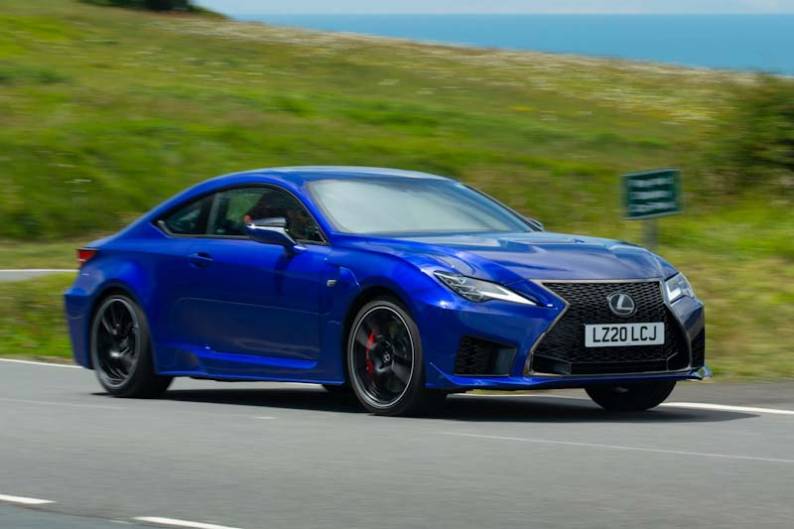
RAC sale – up to 33% off*
• Roadside cover from £5.29 a month†
• We get to most breakdowns in 60 mins or less
• Our patrols fix 4/5 breakdowns on the spot

The banzai Lexus RC F is a coupe that makes rivals like the BMW M4 and the Mercedes-AMG C63 seem almost straight-laced. Jonathan Crouch looks at the improved version.
Ten Second Review
The improved Lexus RC F crashes the sports coupe party with more focused race-derived drive dynamics. As before, a 5.0-litre 450bhp V8 does the honours beneath the bonnet. Front engine, rear wheel drive and a big normally-aspirated engine is a classic recipe and Lexus matches this with sublime build quality and a humungous equipment list.
Background
The Lexus RC F is based on the brand's RC Coupe, a car primarily targeted at American tastes but also developed for Europe with smaller, more efficient turbocharged power. That kind of engine is the sort of thing buyers now expect even in the most potent real-world performance cars: it's certainly what's delivered by the most direct rival this RC F must face, BMW's M4. Lexus though, doesn't simply copy the Germans anymore and instead, has simply uprated the old IS F's normally aspirated old-school V8 for this model - though pared it with a quite astonishing array of driver technology.
It all leaves us posing this car a whole series of searching questions. Have we here the sort of engine still relevant in the modern world? And if it is, are buyers now ready to take Lexus seriously as a manufacturer of top-drawer sports cars? It's time to find out.
Driving Experience
Buckle up, because the RC F's specifications sound fantastic. This improved RC F coupe benefits from changes to boost its performance. Reducing weight was a key target, without diminishing the car's feeling of refinement and solidity. The details are small, but telling, including the use of hollow half-shafts in place of solid components, a slimmer intake manifold and a smaller air conditioning compressor. More kilogrammes have been saved by using aluminium for a number of suspension parts, while maintaining overall stiffness. To gain a more refined feel, stiffer bushings have been added to the suspension arms and steering rack mounts, while the use of more rigid engine mounts helps the RC F better exploit the power of its normally aspirated 5.0-litre V8 engine.
The engine maintains its maximum power output of 457bhp and maximum torque of 520Nm, with a revised intake routing and lower rpm trigger point for the second intake opening. The established eight-speed automatic transmission is retained, but with a higher final drive ratio for improved off-the-line response. To secure the sharpest acceleration from a standing start, a redesign electronic launch control system has been added. This automatically adjusts the traction and throttle control for maximum take-off performance. The driver simply needs to press and hold the brake pedal, then engage the system by pressing a button on the centre console. This enables nought to 62mph to be accomplished in just 4.3 seconds. The RC F further gains new Michelin Pilot Sport 4S tyres, designed specifically for the coupe. These have a unique profile and tread pattern and are made from a special rubber compound. They have been designed to help reduce understeer, improve lateral grip and increase durability in extreme driving conditions.
Otherwise, it's as before. The RC F gets standard fitment Brembo brakes, Sachs monotube shock absorbers, an active rear wing and Lexus's Vehicle Dynamics Integrated Management (VDIM) system. The standard Torque-Vectoring differential helps you get the power down through the bends, giving the driver the choice of with three operating modes to optimise traction and vehicle control in different scenarios, from everyday driving to track performance.
Design and Build
Styling changes made to this revised model include a revised headlight design with a stacked arrangement of LEDs, with integrated daytime running lights. The signature spindle grille has been revised with a lower lip opening that spans the base of the grille, creating the effect of a shorter front facia. At the rear, new tail lights are integrated into a reshaped bumper, giving a cleaner, more chiselled appearance.
Otherwise, it's as you were. There are some coupes that look like saloon cars that are merely down a couple of doors - and then there are cars like the RC F. The design cribs a few cues from the brand's old LFA supercar, most notably in the use of air cooling and aerodynamic features. Air outlets on the bonnet, like those on the LFA, work together with front cooling ducts to support both engine cooling and overall vehicle stability. To the side there are air outlets behind the front wings that add to the engine and brake cooling performance, and which merge neatly with side sill extensions to create an 'L' shape. It features its own interpretation of the Lexus signature spindle grille, which dominates the front of the vehicle and has a subtle 'F' motif embedded in the mesh below the Lexus badge. In profile, there's a sleek roofline and a distinctive curved step in the window line leading into the C-pillar.
The cabin doesn't instantly scream performance car. Instead it looks more like one of Lexus' luxury models. Look closer and you'll spot the sporty cues such as the instrument meters, steering wheel, seats, pedals and trim. It's just very downplayed. The instrument meters mark a further development of the switchable, diving mode-dependent central dial featured in the LFA. The dial pack comprises a large, centrally mounted tachometer that changes according to driving mode, digital and analogue speed read-outs, a differential torque vectoring monitor, a G-force meter, oil and water temperature gauges, mileage information and a stopwatch for clocking that bridge to gantry time at the Nurburgring.
Market and Model
The asking price for this revised RC F (starting at around £63,000) doesn't seem at all unreasonable given that Audi will charge you a much greater amount for its very comparable RS 5 Coupe. You can pay more though for this Lexus. There's an 'RC F Carbon' model with a carbonfibre roof for around £70,000, a more focused 'RC F Track Pack' version for around £73,000 and a top 'RC F Track Edition' variant for around £80,000. As you'd expect from Lexus, you get a ton of standard equipment including full LED headlights with automatic high beam function, a 10-speaker multimedia system including DAB, DVD player, Remote Touch touchpad control and Lexus Premium Navigation, dual-zone climate control and Drive Mode Select. There are also front and rear parking sensors, electric, auto-dimming, folding and heated door mirrors; cruise control, an auto-dimming rear-view mirror, electric steering column adjustment and keyless Smart Entry. The torque-vectoring differential is standard.
Safety provisions include eight airbags, a reversing camera, Hill Assist Control, Lane Departure and Rear Cross Traffic Alert, a blind spot monitor and VDIM, which co-ordinates performance of the ABS, brake assist, traction control vehicle stability control and electronic brakeforce distribution. All RC F models now come equipped with Lexus Safety System+, including a Pre-Collision System and Adaptive Cruise Control,
Cost of Ownership
One of the reasons we thought we'd sadly seen the last of the 5.0-litre normally-aspirated V8 is, and there's no real way of sugaring this particular bit, it was just plain uncompetitive when it came to economy and emissions. Lexus has worked on the engine in the RC F but it can only do so much; the combined cycle fuel figure is 26.2mpg and the CO2 return is 251g/km. Compare these readings to those of a rival BMW M4 (194g/km and 34mpg on the combined cycle).
That comparison comes with a rider though. Modern turbocharged engines are designed to do very well on the EuroNCAP test and tend to fare less well in real world conditions, so while the Lexus RC F might seem like a dinosaur when the published figures are compared, in real terms the disparity in running costs might not be anything like so great.
Summary
Who'd have thought it would have been demure Lexus, of all people, who would bring us what is one of the most politically incorrect supercoupes on general release? Compared to the RC F, the Audi RS 5 and the BMW M4 look like buttoned-down sybarites. It's more on a par with Mercedes' unreconstructed C63 AMG coupe. Jaguar's F-Type R coupe also sports a 5.0-litre V8 but is some £30,000 more expensive and probably plays to a different crowd anyway.
In summary, if you're in the market for something of this kind, I'd urge you to look beyond the press reports and make your own mind up about this RC F. If somebody offered me one of these or a BMW M4 to drive every day for a year, there's no way I'd choose the German car - and I didn't think I'd be saying that before I picked up the keys to this Lexus. It's old school in feel but new wave in execution. And there has to be room in the market for that combination.






![Mercedes-Benz E-Class Coupe [C238] (2017 - 2023) used car review](https://d1ix0byejyn2u7.cloudfront.net/drive/images/made/drive/images/remote/https_d2yv47kjv2gmpz.cloudfront.net/filestore/4/8/9/1_8a528306c095d49/7e49b8d821fdc0cf627fb4c0dab9b220/1984_cab03001dadb535_100_100_70_c1_c_c.jpg)
